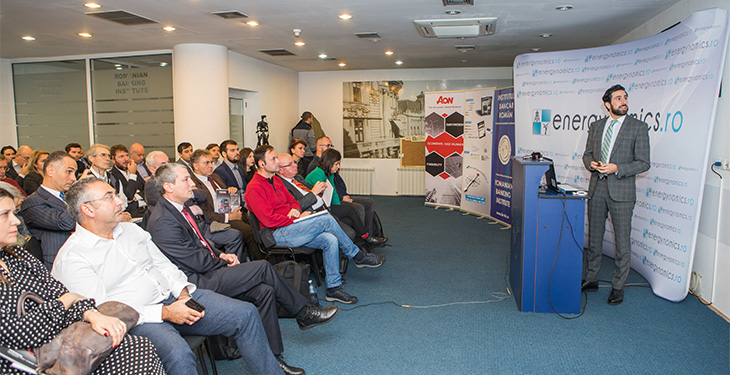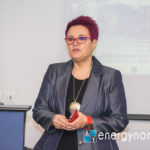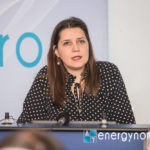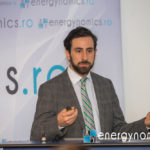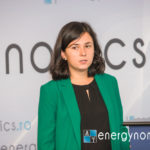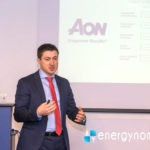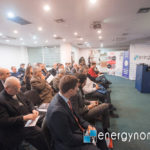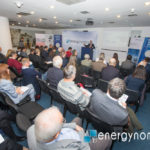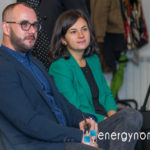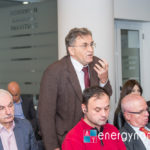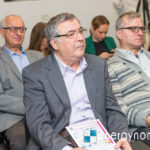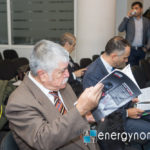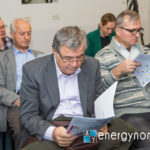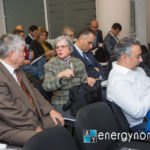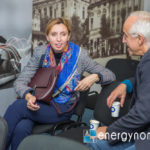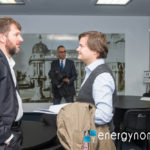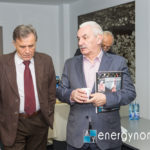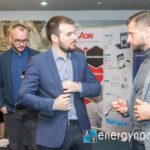The Energy Breakfast Club‘s November 21st edition – “Overcoming the risks in financing energy projects” brought together bankers, insurers, large companies and consultants, as well as some representatives of public authorities, in the assistance. In order to overcome the obstacles and risks in financing, all speakers identified the need for new formats of meetings and applied discussions in which knowledge in different areas (financial, banking, technical, etc.) should be put together for a proper understanding of the realities and possibilities of the energy market. The conversation was opened by Gabriela Hârţescu, general manager of the Romanian Banking Institute, the host of this year’s last Energy Breakfast Club.
She expressed to all those interested the willingness to cooperate from the Romanian Banking Institute: “My invitation is to meet here and to collaborate, and on certain topics to make joint teams in which experts from the energy field, together with banking experts, to build programs of interest”. “For any segment of the energy business, IBR already has training programs in its portfolio starting from highly specialized approaches (e.g. advanced financial analysis) to leadership programs. Together with those interested, we have also developed personalized programs, adding to the over 100 trainings in our portfolio”, said Gabriela Hârţescu.
Claudia Brânduş: The risks stem from the lack of stability of the economic environment
“One of the problems is that we do not work in mixed teams and everyone thinks they know everything,” said Claudia Brânduş, president of RWEA – Romanian Wind Energy Association. The risks are given by the (lack of) consistency and stability of the economic environment in which to invest, Claudia Brânduş summarized before explaining. “At present, the appetite of renewable energy investors is zero, because no one can go beyond the lack of coherence and stability, beyond the country’s lack of vision.” The national strategy continues to mention large investment projects which have not been accomplished for many decades, and the authors of this document do not try to understand why these projects have not been realized.
The WACC for investments in renewable energy projects is close to 11.4% in Romania, while in the rest of Europe this indicator is 5%, the RWEA president said. “We do not have mechanisms for selling energy. We do not have a country vision to predict what will be the electricity generation mix in the future. We do not have an energy law to remain unchanged for at least one year. What we have is a total exposure to the market and permanent market interventions on the part of the authorities.”
The renewable energy sector – wind and photovoltaic – is the most important investor in the Romanian energy industry in recent years, reminded Claudia Brânduş. For the future, new technologies (for storage and demand balance) already allow and compel us to understand the renewable energies are the best solutions. “The energy mix must be addressed by each country; Romania needs coal now, but it will not need coal 20 years from now. We therefore need a clear plan for this transition period to understand how Romania intends to adapt to this new reality”, Claudia Brânduş said.
The standard approach to financing by bank credit
In his intervention, Sebastian Staicu, Project Finance Manager, Corporate Finance Division, BCR, referred to investment opportunities in the Romanian energy sector and outlined in detail how the bank is analyzing a project to identify to what extent it is bankable (the financing principles). “For the new energy projects, we will make good use of the financing model we have used to support renewable energy initiatives, which usually involves dedicated companies (SPVs),” said Sebastian Staicu.
Among the important elements a bank checks is the investor’s quality (previous experience and own financial strength), and the recovery of the loan is to be made strictly from the activity of the SPV, from the financial flow it generates. “If the debt service is too high, then the investor’s own contribution needs to be increased,” said Staicu, adding that BCR provides loans for a maximum of 15 years, but no more than 75% of the lifespan of the asset to be financed.
Long-term commercial contracts are very important, both in regard to raw materials, and for the sale of production; projects must be fully insured to prevent any risks (interruption of activity, etc.). Sebastian Staicu also pointed out the importance of a stable legal and regulatory framework.
DOWNLOAD THE PRESENTATION OF SEBASTIAN STAICU
At the end of his speech, the representative of BCR presented his perspective on investment opportunities in every sector of the energy industry (exploration and production of crude oil and natural gas, renewable, mining, electricity and gas transport and distribution, district heating). Sebastian Staicu expects an increase in the dynamics of infrastructure works (electricity and gas) in the future, as well as in the district heating sector, where the investment needs are very high, but subject to the implementation of a coherent action plan at national level.
ABB – Partnership with the banks
In her speech, Angela Mirea, Product Specialist Engines and Generators ABB Romania exposed the main global trends of the near future, among which the increase in industrial energy consumption is one of the most relevant. Future energy projects will increasingly take into account:
- Grids Interconnection (global super grids)
- Power quality and demand management
- Digitization
- Decentralized production (roof top solar) plus micro- and nano-grids
- Energy storage
A global leader in energy and automation, ABB has responses (industry products, systems and software applications) for industry, transport and infrastructure as well as for utility companies, organized in four divisions: electrical equipment, robotics, automation and grids.
DOWNLOAD THE PRESENTATION OF ANGELA MIREA
“At the moment, ABB is in talks with banks to offer customers a 3-4 year leasing solution for the purchase of such products,” said Angela Mirea. There are two conditions that products have to meet in order to qualify for such approach: to be part of the identified trends (to have an as long as possible lifetime) and to be as standard as possible (for the equipment to be resold if the beneficiary can no longer repay the loan rates). Specifically, ABB considers industrial robots and charging stations for e-cars to be included in a leasing program in partnership with financial institutions.
AON România – Risk management reduces costs
George Dragne, Business Development Director, AON Romania, presented the risk management approach from AON Romania, a company with a global footprint which it allows to have a good understanding of the risks in the energy field. A survey conducted globally by the AON group shows that legislative and regulatory changes ranked the second, with 46% of respondents mentioning it.
- Commodity price risk – 55%
- Regulatory / Legislative changes – 46%
- Political risk and uncertainties – 46%
- Economic slowdown / slow recovery – 44%
- Business Interruption – 38%
George Dragne stressed that the most important part of the insurance premium is the reinsurance premium, which is influenced by three categories of factors: large / catastrophic losses, affecting reinsurers’ costs, international legislation (such as the new GDPR rules), reinsurers risk appetite & profitability targets (sometimes, reinsures move their capacities from an industry to another).
DOWNLOAD THE PRESENTATION OF GEORGE DRAGNE
“The cost with the insurance consultant is included in the insurance premium,” said George Dragne, who added that “if we talk about a strong consultant, he has a sufficiently large portfolio placed with insurers in the market so that it will able to offer commercial discounts”.
George Dragne also said that a large part of the risk costs can be influenced by risk management measures, and much of the costs with risk management are included in the insurance premium anyway. Thus, the quality and know-how of the insurance consultant is even more relevant.
Energy Breakfast Club was organised by energynomics.ro with the support of our partners: ABB România, AON România, BCR.
Around 40 representatives from ABB România, Academia Română, AON România, Ascenta, BCR, Belvedere, Bioterpena System, Conpet, Depogaz Ploiești, Elcen, Elux Rodit, EnergoBit, Fautech Engineering, Garanti Bank, Activ Green Tech, Grup OMIR, ICEMENERG, Kronesolar, Marsh, Ministerul Energiei, Monitorul de Petrol si Gaze, OMV Petrom, ONE Supply & Trading, Revista Electricianul, TEB Energy, Tehnocont, Univers Ingineresc, Uzinsider General Contractor attended the presentations and participated in discussions.
Participation
This year, energynomics.ro will organize 10 Energy Breakfast Club meetings. The schedule and the proposed themes for 2017 are available in the Energy Breakfast Club dedicated page.
